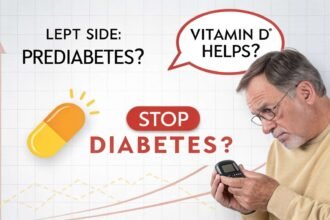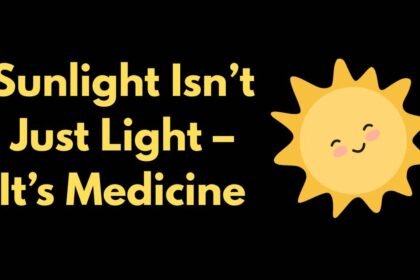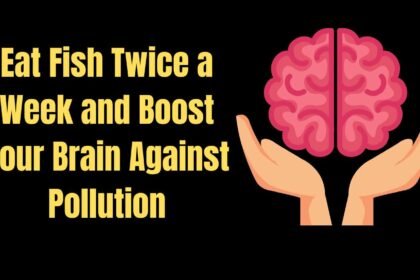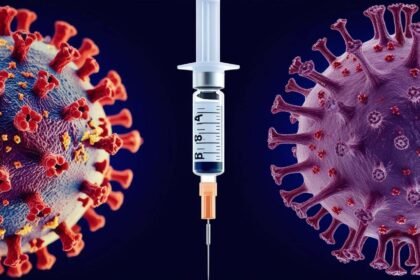A groundbreaking new study shows that a very low-calorie ketogenic diet (VLCKD) may slow biological ageing in obese people.
This gives us hope that losing weight can reverse the negative effects of obesity on health.
The study, which came out in March 2025 in Nutrients, shows how being overweight speeds up epigenetic ageing, which is a way to figure out how old you are biologically based on changes in your DNA, and how a special diet might slow this process down.
What is Epigenetic Aging?
The way our genes work changes over time, and these changes are called epigenetic ageing. DNA methylation is a key process that attaches small chemical tags (methyl groups) to DNA and controls whether genes are “on” or “off.”
These changes get worse with age and can be caused by diseases like obesity, lifestyle, and the surroundings. By looking at methylation patterns, scientists use “epigenetic clocks” to figure out how old living things are.
Horvath, Hannum, and Levine clocks were used to compare biological age to chronological age, which is the number of years someone lived.
Obesity Accelerates the Biological Clock
44 people took part in the study: 24 were obese (BMI >30) and 20 were of a healthy weight. Samples of blood showed big differences.
People who were overweight looked 4.4 years older than they really were, while people who were a healthy weight looked 3.1 years younger.
“Being overweight not only puts stress on your heart and joints, but it also makes your cells age faster,” says Dr. Ana B. Crujeiras, who led the study.
Obesity causes chronic inflammation, oxidative stress, and metabolic failure, which are all signs of ageing. These problems hurt cells and change DNA methylation.
The Ketogenic Diet’s Anti-Aging Effect
Researchers made a big discovery when they kept an eye on 10 overweight people during a 6-month VLCKD program.
This diet limits carbs and calories very tightly, to less than 50 grammes per day and 600 to 800 calories per day, respectively.
This puts the body into nutritional ketosis, a state where it burns fat for fuel instead of glucose.
Results were striking:
- By day 30 (ketosis phase), biological age decreased by 6.1 years.
- By month 6, participants maintained a 6.2-year slowdown in aging.
- Improvements correlated with weight loss (average 20 kg), lower blood sugar, and reduced cholesterol.
In particular, higher levels of β-hydroxybutyrate, a ketone body that is made during ketosis, are highly linked to a slower ageing process. Dr. Crujeiras says, “Ketosis isn’t just about losing weight; it may change how our genes age.”
Why Ketosis Stands Out
Bariatric surgery also helps people lose weight but hasn’t been shown to have a big effect on epigenetic ageing in previous research. VLCKD’s benefits seem to be unique to ketosis.
Ketones, such as β-hydroxybutyrate, can reduce inflammation and free radicals, protect brain cells, and may even help DNA repair.
Dr. David Sinclair, a Harvard expert on ageing who has nothing to do with the study, says, “Ketone bodies are becoming important players in metabolic health.”
This study backs up proof that ketosis can turn on pathways that are linked to living a longer life.
Broader Implications for Public Health
Over a billion people around the world are overweight or obese, which leads to illnesses like diabetes, cancer, and heart disease.
These risks might go down if epigenetic ageing is slowed down. “If we can reverse biological age, we might prevent obesity-related complications,” says Crujeiras.
Also, the study shows how useful epigenetic clocks are as tools for personalised medicine.
“These clocks could be used by doctors to keep track of how changes in a patient’s diet affect their health at the cellular level,” says Dr. Steve Horvath, one of the founders of epigenetic clocks.
VLCKD looks good, but it’s not an option that works for everyone. Due to risks like not getting enough nutrients or losing muscle, the diet needs to be closely watched by a doctor.
A nutritionist named Dr. Priya Khorana says, “It works, but it’s hard. It’s best for people who are severely obese and are being cared for by a professional.”
Some people may get some benefit from gentler methods like intermittent fasting or low-carb diets. Methylation rhythms and ageing are also affected by how much you sleep, exercise, and deal with stress.
In the End
Bigger studies are being planned to confirm the results and look into the long-term effects. Also being looked into is how ketosis affects gut bacteria, which have an impact on metabolism and getting older.
The doctor says, “This is just the beginning.” “Understanding ketosis’s epigenetic impact could revolutionise how we treat obesity and ageing.”
This study makes a strong case for VLCKD as more than just a way to lose weight—it could also be used to slow down the ageing process. Ketosis could help a lot of people live better, longer lives by turning back the biological clock.
As scientists figure out the connections between food, DNA, and getting older, one thing is clear: what we eat affects more than just our waistlines. It also affects the future of our cells.
People who are thinking about VLCKD should talk to a doctor to make sure it is safe and right for them.












